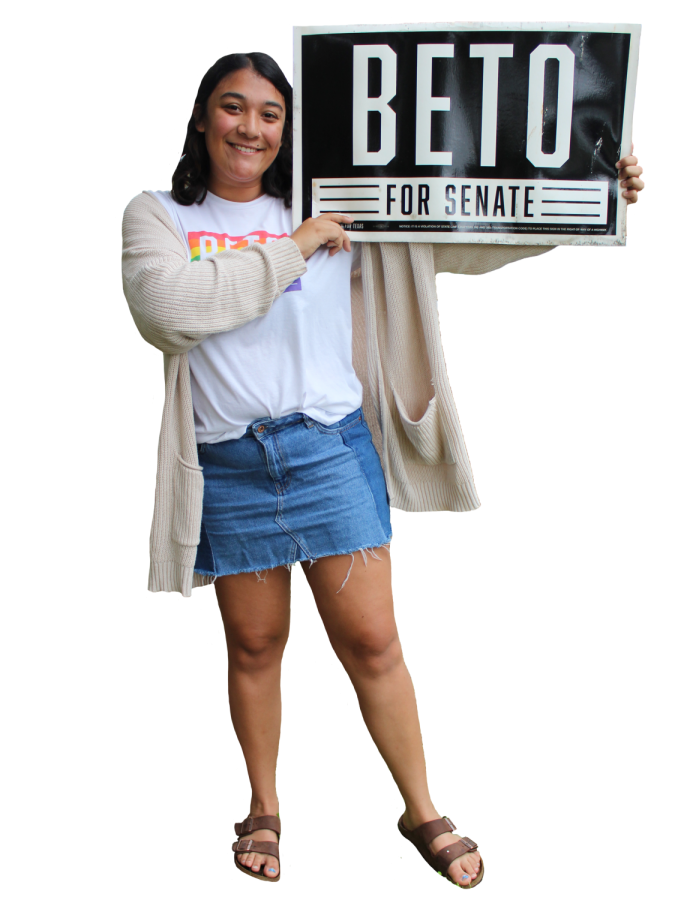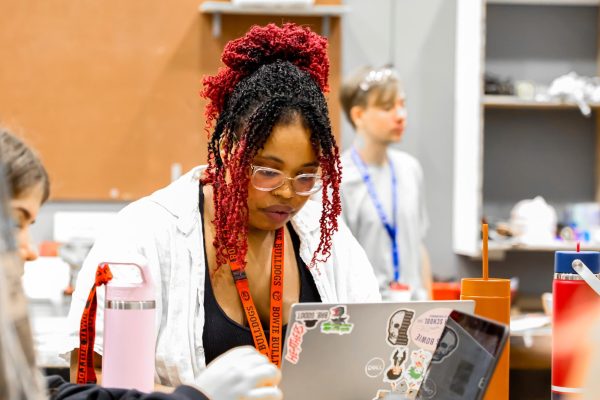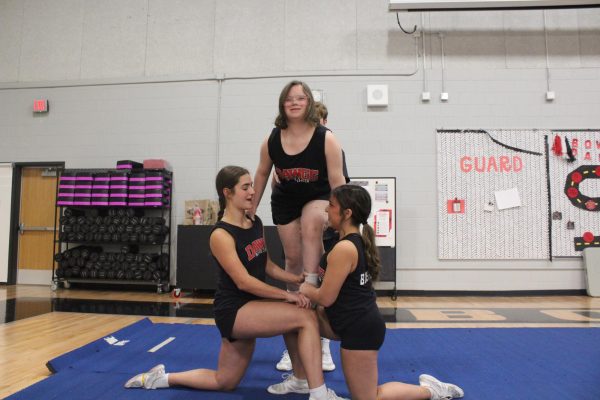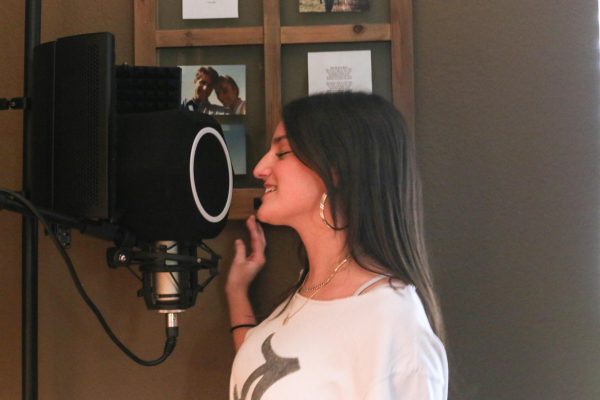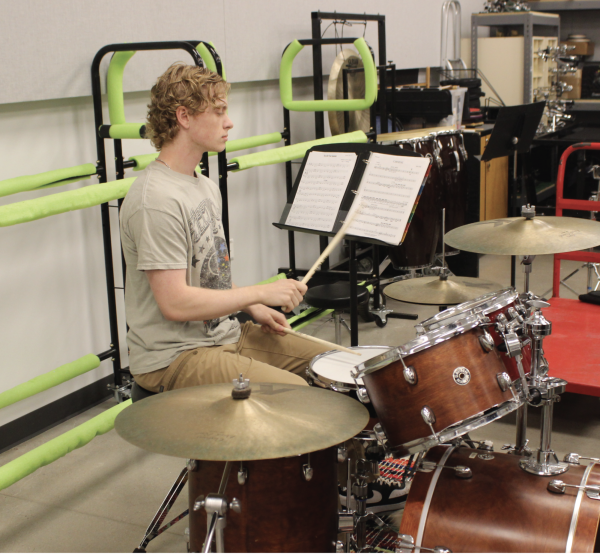Student takes part in state campaign
Senior Taylor Bhuiyan donates her time to the push of Beto O’ Rourke for Texas senate
Bhuiyan got involved in O’Rourke’s campaign as a member of the “texting team,” a group of people in charge of sending pre-made texts to around 800 people on a program called Relay
It’s six p.m. on a Friday night: the football team is getting hyped up for a game, parents are unwinding with a glass of wine on the couch, and downtown Austin is bustling with life. Senior Taylor Bhuiyan, however, is curled up in bed sorting through responses to her mass texts promoting Representative Beto O’Rourke’s campaign for U.S. Senate in Texas.
Over the summer, Bhuiyan got involved in O’Rourke’s campaign as a member of the “texting team,” a group of people in charge of sending pre-made texts to around 800 people on a program called Relay. The program was designed in 2016 when it was used in Senator Bernie Sanders’s campaign for President.
“You’d be like ‘Hey this is Taylor from Beto O’Rourke’s campaign team!’” Bhuiyan said. “‘Voting day’s coming up, are you registered to vote? Are you planning on voting? Do you know who you’re gonna vote for?’ And then they’d send in their responses, and sometimes they were whack, but I would have to respond… with robot responses, so it was really weird. Because there are, like, pre-made messages for them.”
Her involvement in the campaign sparked from her frustration about not being able to vote in the upcoming Texas general election.
“Because [I’m 16] and couldn’t do the act of voting, I wanted to do my part,” Bhuiyan said. “And I feel like I very much so have influenced people to go ahead and register to vote whether they’re strangers or people I see every day. Genuinely I think directly, and indirectly, I’ve impacted people to do what the campaign is talking about, which is register to vote; use your voice because it matters.”
Contrary to the belief that young people shouldn’t be involved in politics because they’re “too young,” people like AP Government and U.S. History teacher Carlen Floyd advocate for students to participate in government.
“It’s about getting you involved and understanding, not just getting involved in a campaign, [it’s] showing up at meetings where ten adults show up and you show up and you have a point of view,” Floyd said. “You have interests you have concerns. When we make decisions about public education, we make decisions about public facilities, we make decisions about transportation— those things all affect you. And if you’re not there and involved, those decisions are being made for you instead of in consultation with you.”
However, Bhuiyan’s political activity didn’t stop at her volunteer work for O’Rourke. On top of being a part of the campaign, Bhuiyan worked as an intern at the state capitol, as well as at a part-time job where she was getting paid.
“I [was working] 30 hours a week, I was [interning] 10-3 twice a week,” Bhuiyan said. “15 hours at the capital, 30 hours at a job, and about eight hours doing the campaign stuff Online. So I lacked friend time, but I feel like in the summer I really found my passion. It was a really beautiful time for me to figure out what was going on with myself and who I want to be. And [that’s] definitely someone in policy and someone who’s politically aware and involved and making an impact.”
Bhuiyan explained that she discovered the texting team by sifting through O’Rourke’s campaign website, emphasizing how easy it is to get involved. Signing up is accessible through a form under a tab labeled “Volunteer” with a specific option to “send texts” for the campaign. Bhuiyan described training as little as talking to a woman on the phone for about an hour.
“I can do this literally from the comfort of my own house, [so] I have no excuse not to,” Bhuiyan said. “I get on my laptop, log in to Relay, I send 800 messages, and then I respond. Which is like, 45 minutes of my own time. And then I check in on it like once a day for a couple days just to make sure I’m getting my responses out and people that want to be informed are informed.”
Drawn to O’Rourke’s natural charisma and similar ideals to her own, Bhuiyan quickly fell in love with the candidate. She described his immigration policies as “courageous” considering Texas’s political background. As listed on the Issues section of his website, the Congressman advocates for the demilitarization of the U.S.-Mexico border, modernization of the visa system, the passing of the 2017 DREAM Act, and other more liberal immigration reforms.
“Well, my dad’s an immigrant and my mom’s family is from Mexico, so the whole concept of building a wall I just find really, really disgusting,” Bhuiyan said. “Just, whenever people go ahead and slander immigrants as if they’re all the same person… you don’t know their story. Negative connotations about immigrants really bother me because that’s literally my family. Like, my dad has spent 20 years of his life trying to bring his family to America and he’s done it successfully, but it’s been hard.”
Her father, Faruque Bhuiyan, who immigrated to the U.S. from Bangladesh, shares a love for politics that Bhuiyan describes is a huge part of her family life. With a liberal mother, a conservative father, and three older sisters, Bhuiyan’s family dinner conversations are never about something as trivial as the weather.
“My family has a very diverse background,” Bhuiyan said. “[Politics are] something that we talk about every day. It’s like a dinner conversation for us. It’s not something we shy away from because it shouldn’t be. It’s probably the most important thing to talk about because it’s what influences our daily lives whether we notice it or not.”
Taylor’s third oldest sister, Shelby Bhuiyan, describes how involved their family is in each other’s lives. By spending most weekends together, the Bhuiyan household has plenty of time to bond.
“Taylor has always been unapologetically Taylor,” Shelby said. “And that’s probably my favorite thing about her. Even though she’s the youngest of us four sisters, she’s always had the biggest personality and fearlessness to have her own interests.”
One of the most integral pieces of Taylor’s upbringing she explains was her parents’ encouragement of her independence. By having to pay for everything from clothes to concert tickets, Taylor feels that she can put her hard work towards anything she desires to achieve in life.
“My parents never handed me anything just for the h–l of handing me something, they made me go work for it,” Taylor said. “I want to be the change because that’s how I grew up that’s how anything I wanted happened. I had to go do it. I see [the impact of my upbringing], like, with my friends. They have a much different background from me, and yeah, they care about the things that I’m doing and saying, but they don’t actually go out and do it.”
Shelby describes their upbringing as one fraught with contradictions due to their parents’ different backgrounds and opinions.
“They both wanted us to be strong and independent, but my mom is more liberal and my dad is more conservative so that kind of made us choose sides,” Shelby said. “In summation, they succeeded in raising four smart, strong, independent, opinionated women.”
Taylor attributes her radiant personality to that of her mother’s, using her as a role model for she hopes to become.
“Her character has shaped me a lot,” Taylor said. “Like, growing up, her and my dad would just bicker about everything, but she always won because she just has an aura about her that she’s like ‘I’m gonna end this conversation and I’m gonna win it’ And that’s just always how it’s been and I’m just like, that’s me. That’s what I want to be. So that’s what I am.”
As a member of several minority groups, Taylor takes discrimination to heart and is determined to use her voice in order to speak up for those who can’t. Whether it’s using her various social media platforms, political connections, or pursuing a career in politics, Taylor is certain that she will make an impact.
“The fact that I’m able to volunteer my time and work with cool, courageous ladies like the state representative I worked under, Nichole Collier, she basically stands for everything I stand for,” Taylor said. “She herself is also a minority; she’s a black lady in politics. In Dallas.”
Growing up in a predominantly white suburb of Austin in a country founded on Christian beliefs, Taylor feels her community can show little consideration for religions different to their own. Taylor herself is an atheist, but her father is Muslim while her mother is Catholic.
“Whenever I was in the seventh grade, I was forced to say grace with my volleyball team because a mom brought us Bush’s,” Taylor said. “And they were like ‘Okay everyone say grace,’ and I was like ‘That’s not my move.’ And I just got the nastiest stares as if I had just murdered someone. And so I appeased them and I said grace and I said amen and I was like, what the h–l? This is wrong.”
Right now, Taylor’s plans for her future involve becoming a social justice attorney, which is a type of lawyer who represents those who are marginalized in society. She hopes to assure that underrepresented individuals get the liberties the Constitution grants all citizens of the U.S. If she’s financially stable enough, Taylor also explained how she one day hopes to start a nonprofit organization centered on political awareness.
“I feel like people view policy very black and white and that’s anything but the case,” Taylor said. “There’s a lot of color in it and I think with my personality and just being a loud minority lady, I could bring a lot to that field of work. I feel like its lacking in that and I would love to impact that field.”
Taylor argues that every voice matters in spite of the common idea that young people do not possess enough world experience to make fully informed decisions about policy. For Taylor, this means advocating for everyone no matter how old they are.
“I think it’s great that young people are politically active because people form their own opinions at as young as 12, and who’s to say that just because I’m 16 my opinion isn’t as valid as someone’s who’s 72,” Taylor said. “I don’t understand why someone would shun someone for having their own mind.”
Impassioned by her ethnic background, personal experience with discrimination, love for politics, and courageous personality, Taylor hopes to influence others to get involved and use their voice.
“Yes, absolutely [student voices matter],” Taylor said. “We’re the future are you kidding? We’re literally the future. Our generation is gonna rock. I’m so excited. I just don’t see how someone can be like ‘your voice doesn’t matter.’ Even if it doesn’t directly show, we’ll have our time. And it’s coming.”
Your donation will support the student journalists of James Bowie High School. Your contribution will help cover our annual website hosting costs. Any contributions made through this service are NOT tax deductible. If you would like to make a tax deductible donation OR to subscribe to our print edition, please contact us at [email protected].



